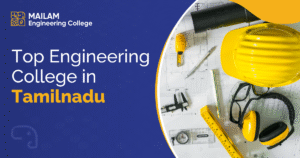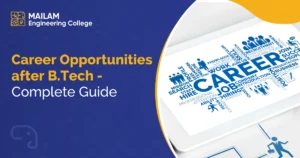Choosing the right engineering course is one of the most critical decisions in a student’s academic journey. With dozens of specialisations, evolving industries, and the rise of interdisciplinary technologies, the challenge is about picking the right course that sets you up for long term success.
In this blog, we’ll break down everything you need to know about how to choose right engineering course, from self-assessment to career goals, industry trends, and practical decision making.
Why Is It So Important to Choose the Right Engineering Course?
Many students follow the herd when choosing an engineering branch. Some choose based on peer influence, others by parental pressure, and many blindly opt for “popular” branches like CSE or ECE without considering their personal interest or aptitude.
However, this approach can lead to dissatisfaction, burnout, and difficulty in academic performance or job readiness. That’s why understanding how to choose right engineering course is the foundation of your future success and happiness.
How to Choose Right Engineering Course for You: A Complete Guide
Step 1: Understand Your Strengths, Interests, and Aptitude
Before even looking at course brochures or salary stats, look within. Ask Yourself:
- Do I enjoy problem solving or creative design?
- Am I more logical or artistic?
- Do I prefer working on computers or machines?
- Can I handle complex mathematics?
- What subjects do I naturally excel at?
Tools like aptitude tests, personality assessments (like MBTI), and even simple journaling can help you understand your learning style and career preferences. This is the first and most crucial step in figuring out how to choose right engineering course.
Step 2: Get Clarity on Career Goals
Some students have a clear career goal, like becoming a data scientist, automobile designer, or aerospace researcher. For others, the destination is vague. That’s okay too. However, having a sense of what kind of lifestyle or work environment you want can guide your course selection.
For example:
- If you love innovation and future tech → Computer Science, AI/ML, or Data Science might suit you.
- If you enjoy machines, mechanics, and automation → Mechanical or Mechatronics could be your path.
- If you want to work in electronics or IoT → Consider ECE or Robotics.
- If you’re interested in building infrastructure → Civil or Structural Engineering.
Understanding your goal, even loosely, makes it easier to understand how to choose right engineering course based on the destination you want.
Step 3: Explore the Different Engineering Branches
Here’s a simplified overview of major branches and what they offer:
1. Computer Science Engineering (CSE)
- Focus: Software, AI, Web & App Development, Cloud, Cybersecurity
- Ideal for: Logical thinkers, coders, tech-lovers
2. Electronics and Communication Engineering (ECE)
- Focus: Electronic circuits, telecom, embedded systems, IoT
- Ideal for: Students who enjoy physics, circuits, and communication systems
3. Mechanical Engineering
- Focus: Machinery, design, thermodynamics, manufacturing
- Ideal for: Students who enjoy mechanics and hands-on work
4. Civil Engineering
- Focus: Construction, design, surveying, project management
- Ideal for: Students interested in building structures and infrastructure
5. Electrical Engineering
- Focus: Power systems, circuits, control systems
- Ideal for: Analytical minds who love energy, math, and design
6. Information Technology (IT)
- Focus: Software development, database systems, network security
- Ideal for: Similar to CSE, but with more application-oriented learning
7. Artificial Intelligence & Data Science
- Focus: Machine learning, data mining, AI algorithms
- Ideal for: Students with strong logic and interest in futuristic tech
8. Biomedical Engineering
- Focus: Medical devices, imaging systems, biology-meets-engineering
- Ideal for: Science-minded students who want to improve healthcare
These overviews can act as a filter in your process of how to choose right engineering course.
Step 4: Consider Industry Demand and Future Trends
It’s important to balance your passion with market relevance. Ask:
- Which industries are growing?
- Which technologies are shaping the future?
- What skills will be in demand 5 – 10 years from now?
High-growth areas:
- AI/ML and Data Science
- Cybersecurity
- Robotics and Automation
- Renewable Energy
- Infrastructure and Smart Cities
- Healthcare Engineering
Keeping an eye on industry trends ensures your decision on how to choose right engineering course aligns with long term employability.
Step 5: Evaluate Curriculum and Practical Exposure
Before finalising a course, go through its syllabus. Some branches might sound appealing, but you may dislike the subjects involved. Check for:
- Lab and practical components
- Industry internships
- Research opportunities
- Certifications offered
- Tools or programming languages taught
The depth and breadth of the curriculum matter when figuring out how to choose right engineering course that aligns with your preferred learning style.
Step 6: Talk to Experts and Alumni
Sometimes, real insights come from those who’ve been through it.
Reach out to:
- College seniors and alumni
- Industry professionals
- Professors and academic advisors
Ask them:
- What are the pros and cons of this course?
- What kind of jobs or internships did they get?
- Would they choose this course again?
This qualitative input is crucial in your decision making process around how to choose right engineering course.
Step 7: Don’t Ignore Placements and Salary Trends
While passion is important, practical realities matter too. Look into:
- Average placement rates for the course
- Companies visiting campus
- Salary packages offered
- Scope for higher education or research
If you’re comparing two branches you love equally, pick the one with better placement trends. This adds a financial filter to your decision on how to choose right engineering course.
Step 8: Match Course with College Facilities
Not all colleges offer the same infrastructure for all departments. Before joining, check:
- Lab quality and equipment
- Research centers
- Industry tie-ups
- Workshops and tech events
- Faculty experience
Step 9: Look Beyond the Course – Choose the Right Ecosystem
Even the best course can feel dull if the college environment is poor. Make sure your college offers:
- Clubs and co-curriculars
- Cultural and tech fests
- Entrepreneurial support
- Certifications
- Student mentoring programs
The overall ecosystem will play a huge role in your growth and happiness. It’s an underrated but essential step in understanding how to choose right engineering course wisely.
Step 10: Keep Future Flexibility in Mind
Some courses offer more flexibility for interdisciplinary learning or switching to other careers later. For example:
- CSE and IT can lead to careers in design, product management, or even finance
- Mechanical and ECE can transition into robotics, automotive, or defence
- Civil can branch into project management or urban planning
Pick a course that gives you room to pivot if needed. In a world where careers evolve fast, flexibility matters when deciding how to choose right engineering course.
Common Mistakes to Avoid
1) Choosing for prestige, not interest
Don’t pick CSE just because it’s trending. Pick what excites you.
2) Ignoring aptitude
If you’re poor at math, think twice before selecting heavy-math courses.
3) Not checking the curriculum
Don’t assume what a course teaches. Read the syllabus.
4) Skipping future outlook
Some fields are declining or have limited scope. Research is key.
5) Deciding on pressure
This is YOUR career. Make sure your decision reflects YOUR goals.
Avoiding these errors will help you stay clear minded while figuring out how to choose right engineering course.
Why Mailam Engineering College is an Ideal Choice
Mailam Engineering College stands as a beacon of quality education and innovation in Tamil Nadu. If you’re passionate about AI, civil engineering, mechanical systems, or next gen electronics, Mailam offers structured programs across domains. With:
- Industry aligned syllabi
- Modern labs and tech enabled classrooms
- Strong placement partnerships
- Experienced faculty
- Support for student research and startups
Mailam ensures that students learn but thrive. If you’re trying to figure out how to choose right engineering course, Mailam gives you both the options and the support to succeed, academically and professionally.
Final Thoughts: Be Curious, Be Honest, Be Informed
There’s no “one right course” – only the one that’s right for YOU. The secret to how to choose right engineering course lies in combining:
- Passion
- Aptitude
- Future trends
- College ecosystem
- Placement potential
Engineering is a foundation for the next 40 years of your life. Choose wisely, and you’ll love what you do.
FAQs on Choosing the Right Engineering Course
1. How early should I start thinking about engineering specialisations?
It’s never too early to start exploring your interests, but a good time to get serious is in Class 11. By Class 12, you should be narrowing down your preferences based on aptitude tests, career goals, and market trends. Starting early gives you the time to research courses, attend webinars and speak with industry experts.
2. What if I’m good at both computers and mechanics?
If you enjoy coding as well as working with hardware, Mechatronics or Robotics Engineering might be your perfect fit. These interdisciplinary fields blend mechanical systems, electronics, control engineering, and software development.
3. Is coding necessary for all engineering branches?
Not necessarily, but basic coding skills are becoming relevant across all domains. Even if you’re studying Mechanical, Civil, or Electrical Engineering, understanding programming (like Python or MATLAB) can give you an edge in simulations, data analysis, and automation tasks.
4. Can I switch branches after the first year?
Yes, many engineering colleges offer lateral movement between departments after the first year, provided you meet academic performance criteria and seat availability. This option is especially useful if you realise early on that your chosen stream doesn’t align with your interests or strengths.
5. How important are internships during college?
Extremely important. Internships bridge the gap between theory and practice, giving you real world exposure to how industries operate. They help you apply what you’ve learned, build your resume, and network with professionals.







